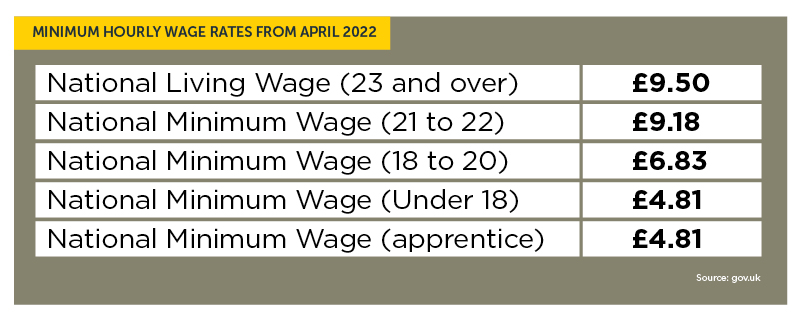“It’s better than it looks on paper.” That’s what skills minister Alex Burghart told FE Week when we asked him if the £4.81 an hour apprentice minimum wage was enough in the face of rising prices.
That was back in March, the day before the chancellor Rishi Sunak delivered his spring statement in the House of Commons, which pledged to ease cost of living pressures.
With universal concern about the declining numbers of young people taking up apprenticeships, and as the sector tries to understand the reasons behind eye-watering dropout rates, coming back to pay was, and still is, a fair issue to press.
The minister let slip at the time that he believed the median income for apprentices was around the £8.24 mark and reminded FE Week that apprentices over age 19 who have completed the first year of their apprenticeship are entitled to the minimum wage.
There hasn’t been any research on apprentice pay since the Department for Business, Energy and Industrial Strategy’s apprenticeship pay survey for 2018/19.
So to better understand today’s marketplace for aspiring apprentices, FE Week crunched the numbers from over 10,000 apprenticeship vacancies that were live on the government’s Find an Apprenticeship website at the end of April.
What we found was a much bleaker picture than the skills minister would have us believe.
Apprenticeships with good wages are ‘like gold dust’
Half of all intermediate level apprenticeship opportunities were advertised at the legal minimum of just £4.81 an hour. This proportion only slightly reduces – to 46 per cent – when apprenticeships at all levels are factored in.
The apprentice minimum wage is applicable to under-19s for the duration of their apprenticeship. For apprentices aged 19 and over, the reduced hourly rate only applies in their first year.

With crystal clarity, Tony Scannell told FE Week, “£4.81 an hour isn’t enough to live on. It’s crippling.” Scannell is a member of the National Society of Apprentices’ leadership team, which is made up of apprentices.
“Everyone at work deserves the living wage,” he said. “There’s no apprentice rate for our bills, there’s no apprentice rate for our weekly shop and there’s no apprentice rate for our bus fares.”
Then, he added, there are “the tools, the boots, the workwear…it’s not cheap. Apprenticeships with good wages are like gold dust.”
On that last point, he’s not wrong. FE Week’s analysis of apprenticeship vacancies found that 91 per cent of vacancies were advertised below the national minimum wage for 21-year-olds (£9.18 an hour) and 93 per cent advertised below what the government describes as the ‘national living wage’, set currently at £9.50 an hour.
We even found that one in five degree apprenticeships were advertised at the £4.81 minimum.
With the cost of living continuing to rise, Scannell believes that apprenticeships will be simply unaffordable for young people, especially those with, as he put it, “any kind of responsibility – being a parent, paying rent or even just expected to make a contribution to household bills.

“The cost of living crisis pushes us from just getting by with a second job, or some manageable debt… It’s sad to see so many apprenticeships slip out of being affordable. Do they really think a 50 per cent dropout rate is because we’re all winning the lottery?”
With rising bills, it can’t be a surprise if aspiring apprentices glance twice at £11 an hour vacancies at Amazon, or literally any other job offering a wage you can live on.
But depressingly little is known or discussed about apprenticeship pay and access, especially at the lower end. When it is discussed, it’s often the case that the employers’ needs come first.
Lower pay reflects employer investment in training
FE Week shared our findings with the Low Pay Commission (LPC), the body responsible for recommending the various minimum wage rates for the government to accept.
The LPC explained that the last rise in the apprentice minimum wage rate, from £4.30 an hour to £4.81 an hour, this April, was the largest percentage increase of all the minimum wage rates.
“Our role is to raise apprentices’ wage floor as high as possible without harming their employment prospects. Apprentices’ pay reflects the investment employers make in their training,” the LPC’s chair, Bryan Sanderson, told FE Week.
The LPC will make its recommendations for next year’s minimum wage rates in October, to apply from next April.
“We’re keen to hear evidence on the impact of the cost of living crisis on apprentices and other young workers, and encourage responses to our consultation, which is currently open.”
The LPC points out that the Find an Apprenticeship site doesn’t necessarily reflect the apprenticeship vacancy marketplace. Research it published in December 2021 found that higher level, and therefore higher paid, apprenticeships were less likely to be found on Find an Apprenticeship.
It didn’t explain why, but the gap between starts and advertised vacancies at higher levels can probably be explained by a larger proportion of those apprenticeships going to existing employees.
The last time the government looked at apprentice pay was in its 2018/19 apprenticeship pay survey. The survey, commissioned by the Department for Business, Energy and Industrial Strategy (BEIS), included just over 4,000 telephone interviews with level 2 and 3 apprentices. From those interviews it calculated employers were on average paying £5.90 and £7.65 an hour wages for level 2 and 3 apprentices respectively.
The BEIS methodology means that researchers could identify employers that were illegally paying below the minimum wage when hours actually worked were worked out against hours paid.
FE Week asked BEIS if it would be updating its research on apprentice pay but the department did not respond at the time of going to press.
FE Week’s analysis of April 2022 vacancy data shows average wages on offer for level 2 apprenticeships were 18 per cent lower than were being paid in 2018/19. For level 3 apprentices, we found a 34 per cent drop (see table).

Training providers say low pay is holding back apprentice starts and is contributing towards dropouts.
The Association of Employment and Learning Providers (AELP) told FE Week that “filling vacancies and keeping people on programme” are among their members’ greatest concerns.
Its chief executive, Jane Hickie, said, “Providers just can’t keep the learners on programme, as many who would benefit from apprenticeships can’t afford to take a salary lower than the living wage, particularly with inflation and the cost-of-living crisis.
“We know from speaking to providers that low wages are also a cause for dropout, impacting in turn on completion rates.”
Hickie calls for a reinstatement of the enhanced cash incentive scheme for employers, specifically for young apprentices. “We would also strongly encourage employers to offer higher wages to attract and retain good candidates,” she said.
A DfE spokesperson said: “Apprentices are at the forefront of our skills revolution and that is why we’ve increased their national minimum wage by 11.9%, aligning it with the under 18 national minimum wage, so that even more young people have the confidence to take up opportunities to learn and grow through an apprenticeship – earning and learning at the same time.”

















Your thoughts